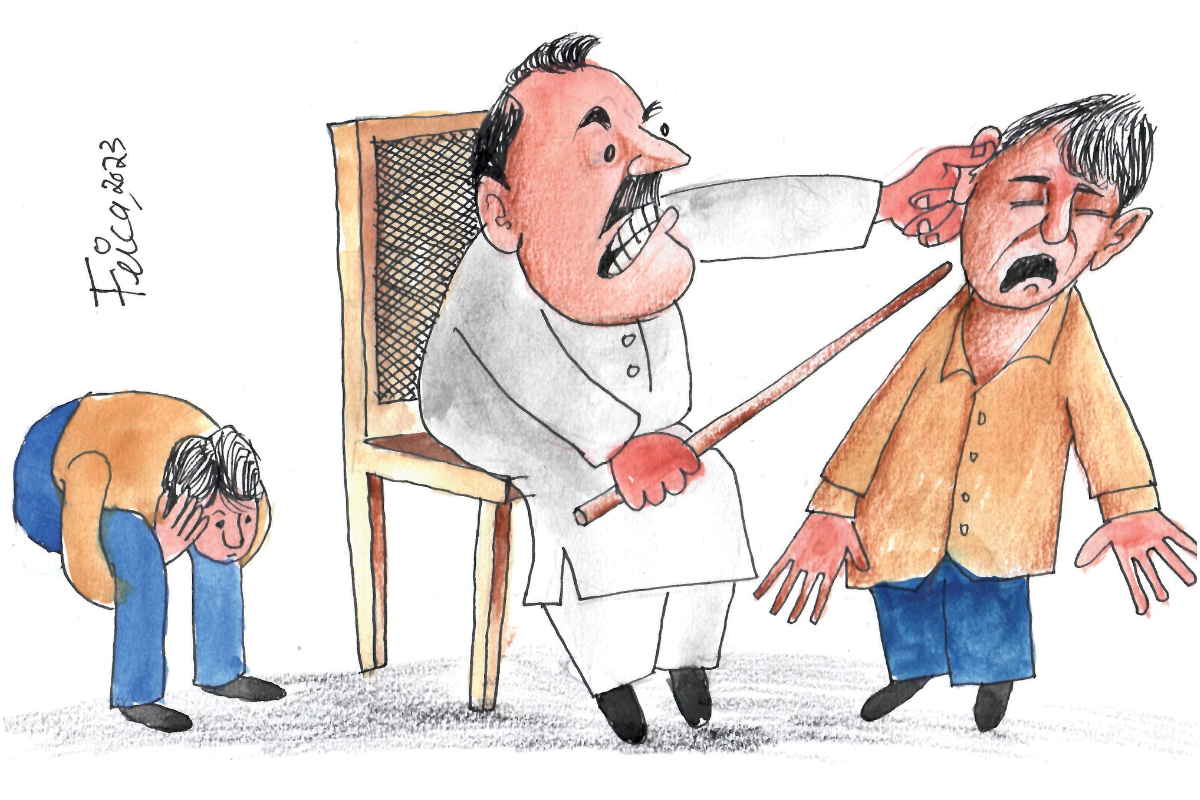
Punishing pupils
Despite legislation, corporal punishment continues in public schools
Lahore: Zafar Iqbal was at home when he received a frantic call from the peon of a nearby private school where his son, Faizan, 13, is in class nine. The school is only half a kilometre from his home in Fatehpur, a town in the Layyah district of south Punjab.
”I became uneasy after the call because the caller sounded panicked,” Zafar told Bol News.
”I was informed that my child was being mercilessly beaten by the school’s teacher and principal. On the phone, I could hear his cries,” he said.
He dashed to school and arrived in five minutes.
”But I was late; while they (the principal and the teacher) were beating Faizan black and blue, he became too exhausted to even cry. When he saw me, he gathered his strength and began crying, while the teacher and principal, who were not expecting me, took a step back and began justifying flogging Faizan,” Zafar lamented.
They claimed they were ”merely punishing my son for the sake of his future.” Meanwhile, Faizan had passed out. When the principal, Imtiaz Ali, and the teacher, Wajid Ali, saw his situation deteriorate, they fled the school grounds. He brought his son to the Fatehpur Tehsil Headquarters Hospital with the help of the school (Beacon Light School), only to discover that his right arm had been fractured.
After obtaining a medico-legal certificate, Zafar contacted Fatehpur police and filed a case against both the principal and the teacher under Pakistan Penal Code Sections 328-A (exposure and abandonment of a child under the age of twelve by a parent or other person having care of it) and 34 (acts done by several persons in furtherance of a common intention).
Between calling the police and registering the case, Zafar was under pressure from his family and other locals not to report the incident. He, on the other hand, refused to budge and had the case registered. According to the police, the suspects have been granted bail by the court.
”Faizan might miss his class nine exams in May because he simply cannot hold a pen,” Zafar explained. Faizan will recover and take exams the following year, but he will never want to go to school again because of the severe torture he and his classmates may have endured over the years.
”Flogging is the leading cause of dropout, with an estimated 22.8 million children leaving school each year due to classroom spanking,” researcher Syeda Sakina Abid said. According to her, teacher punishment is a culturally acceptable practise in the country, resulting in a large number of children dropping out or becoming dissatisfied with their education.
Zafar admitted to feeling local pressure when he launched police action against child abusers.
Education is a fundamental human right. The right to education includes both free and compulsory elementary education, as well as high-quality education in both public and private schools. It is critical for long-term stability and prosperity, as well as for individual, economic, and societal development. Education is the ultimate right and the source of societal knowledge. The right to education, according to international law, includes the following: The right to an education is guaranteed by Article 26 of the Universal Declaration of Human Rights, and the 1960 UNESCO Convention against Discrimination in Education affirms the elimination of all forms of discrimination in education provision.
According to educationist and author Syed Shamim Azam, the government has passed legislation prohibiting corporal punishment for children, but this is violated in some way in all public schools every other day. One such bill was passed by the National Assembly in 2021, and before that, the governments of Punjab and Balochistan made spanking in schools illegal.
Malala Yousafzai met with then-chief minister Chaudhry Parvez Elahi in December last year and asked him to abolish school-related punishment. Her request was granted, as the former chief minister issued an order prohibiting spanking in schools and seminaries, particularly in female schools.
”Declaring an act illegal is one thing, but it is far from sufficient because the illegality must be accompanied by some sort of punishment,” stated advocate Naseem Abbass of Muzaffargarh.
”School-related spanking has been a contentious issue in court because Section 89 of the Pakistan Penal Code shields parents, guardians, and school personnel from punishment and allows them to ”beat” children in good faith,” he added.
The bill’s proponent, former federal minister Dr Shireen Mazari, claimed that the bill passed in 2021 addressed the loophole and suggested punishment for the perpetrators.
So far, Zafar has remained steadfast in the case. He claimed he would go to any length to have the culprits punished.
”I have been informed that the parents of a child in Vehari pardoned the seminary teacher who beat their son to death for failing to memorise the lesson. I have also been told Faizan was also beaten for not memorising lessons,” Zafar maintained.
However, he remains firm on making Faizan’s teacher and principal a lesson for others.
Catch all the Urban Insight News, Breaking News Event and Latest News Updates on The BOL News
Download The BOL News App to get the Daily News Update & Live News.












 Read the complete story text.
Read the complete story text. Listen to audio of the story.
Listen to audio of the story.